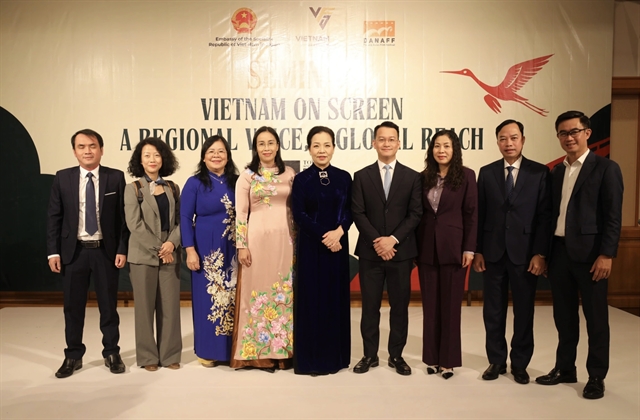 Life & Style
Life & Style


|
| Vietnamese delegates at the seminar. Photo courtesy of VFDA |
TOKYO — The Việt Nam Film Promotion Programme, organised by the Việt Nam Film Development Association (VFDA) in collaboration with the Embassy of Việt Nam in Japan, took place at the Tokyo International Film Festival (TIFF) from October 27 to November 5.
A key highlight of the programme was the seminar titled Việt Nam on Screen: A Regional Voice, A Global Reach, held within the framework of TIFF 2025. The event featured two in-depth panel discussions, including 'Cinema Without Borders: Việt Nam in the Asian and Global Context' and 'Filming in Việt Nam: Potentials and Practices.'
It brought together Vietnamese and international filmmakers, producers and industry experts to explore opportunities for collaboration and the growing global presence of Vietnamese cinema.
A regional voice, a global reach

|
| Ngô Phương Lan, Chairwoman of the VFDA speaks at the seminar. Photo courtesy of VFDA |
Ngô Phương Lan, Chairwoman of VFDA, said that although Việt Nam’s film industry started later than many countries in the region, it has been rising strongly and recovering steadily after the COVID-19 pandemic.
Việt Nam is the first, and currently the only, film market in Asia to surpass its pre-COVID-19 revenue level. The market share of Vietnamese films reached 44 per cent in 2024, compared to 25 per cent for American films.
"VFDA’s participation in the 38th TIFF is on a much larger scale and with more diverse activities than in 2019 and 2022. Through this series of film promotion activities at TIFF, VFDA aims to continue promoting Vietnamese cinema in key international markets and film festivals," said Lan.
Ambassador Phạm Quang Hiệu emphasised: "Cinema is not only an art form but also a source of soft power for every nation. Connecting film festival activities with cooperation forums like today’s event helps promote tourism, investment, and cultural exchange between the peoples of Việt Nam and Japan."
Seiko Noda, Chairwoman of the Parliamentary Association for the Promotion of Japanese Cinema and a member of the House of Representatives, expressed her hope that film exchanges between the two countries will help strengthen friendship, deepen mutual understanding of each nation’s history and culture and open opportunities for co-productions that can achieve global reach.

|
| Director Bùi Thạc Chuyên, whose film Địa Đạo - Mặt Trời Trong Bóng Tối (Tunnel: Sun In The Dark) was selected for the World Focus Section at the Tokyo International Film Festival 2025. Photo courtesy of VFDA |
Director Bùi Thạc Chuyên, whose film Địa Đạo - Mặt Trời Trong Bóng Tối (Tunnel: Sun In The Dark) was selected for TIFF this year, said that participating in international film festivals is only the first step. The greater goal is to bring Vietnamese films to international audiences.
He noted that when Việt Nam has greater visibility economically and culturally abroad, that’s when Vietnamese cinema will truly go global.
Producer Trần Thị Bích Ngọc observed that the number of films produced in Southeast Asia has significantly increased, a result of growing cooperation among countries in the region, as well as with Japan and Europe.
Improvements in Việt Nam's filmmaking environment
At the seminar, from a domestic perspective, speakers shared three major improvements in Việt Nam’s film production environment.
These include streamlined administrative procedures through the “one-stop, single-contact” mechanism implemented in many localities; more proactive support from local authorities, offering free or reduced fees at heritage and scenic sites; and rapid advancements in digital infrastructure, with nationwide 5G coverage and comprehensive cultural–tourism databases available for production use.

|
| Producer Lương Công Hiếu (right) and Lý Phương Dung, Vice Chairwoman of VFDA and former Deputy Director of the Department of Cinema speak at the seminar. Photo courtesy of VFDA |
Producer Lương Công Hiếu noted that film production in Việt Nam has become much more convenient over the past five years.
He highlighted that filming permits are now directly supported by local authorities. Film crews of 100–200 members often receive free access to tourist attractions, historical sites, and conservation areas, along with detailed guidance on local regulations to ensure smooth production, as well as free support for security and order during filming.
Lý Phương Dung, Vice Chairwoman of VFDA and former Deputy Director of the Department of Cinema, shared that new policies to develop the film industry are now being implemented effectively and align with global trends.
Vietnamese film organisations cooperating with foreign partners no longer need to apply for special production permits. Foreign organisations or individuals wishing to film in Việt Nam or use local locations can conveniently submit applications directly via the national online public service portal.
However, Dung also pointed out that Việt Nam has not yet introduced tax rebate policies for foreign film producers and still lacks a national studio complex meeting international technical standards.
Nguyễn Thị Anh Thi, Vice Chairwoman of the Đà Nẵng People’s Committee, affirmed the city’s goal of building the Đà Nẵng Asian Film Festival (DANAFF) into a 'bridge of Asian cinema,' boosting the entire film industry value chain.
Đà Nẵng hopes to establish international partnerships with cities such as Fukuoka and Tokyo, Japan, to exchange experts, co-host film screenings, and learn from organisational experience.
During the open discussion session, many international producers and experts expressed strong interest in future collaboration with Việt Nam.
Japanese anime filmmakers raised questions about human resources, post-production infrastructure and potential cooperation in animated film production in Việt Nam, showing clear enthusiasm for the technical capabilities and creative potential of young Vietnamese filmmakers. — VNS




